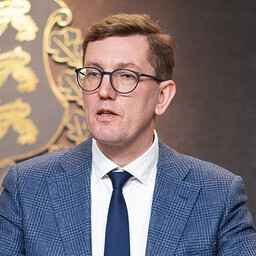Peaminister Kristen Michal ütles, et
toidukaupade käibemaksu vähendamine
vajab raha. See raha tuleb kas suurte kärpete või uute maksudega.
toidukaupade käibemaksu vähendamine
Tõlge fraasile: toidukaupade käibemaksu vähendamine
EN
reduction of VAT on food products
Michal lisas, et Eesti riigil on raha napilt, sest
kaitsekulud on kasvanud
. Kogu maksutulu läheb Eesti vabaduse kaitsmiseks. Siiski on
eelarves puudujääk
ja riik peab laenama.
kaitsekulud on kasvanud
Tõlge fraasile: kaitsekulud on kasvanud
EN
defense costs have increased
eelarves puudujääk
Tõlge fraasile: eelarves puudujääk
EN
budget deficit
Üle 50 000 inimese on alla kirjutanud
rahvaalgatus
ele, mis tahab toidukaupade käibemaksu vähendata 10 protsendini. Sotsiaaldemokraatliku Erakonna juht Lauri Läänemets toetas seda petitsiooni.
rahvaalgatus
Tõlge fraasile: rahvaalgatus
EN
people's initiative
Toiduainete käibemaksu langetamist on varem nõudnud EKRE ja Keskerakond. Nüüd toetab seda ka Sotsiaaldemokraatlik Erakond. Lauri Läänemets ütleb, et langetus aitab inimestel ja toetab põllumajandust.
Michal ütles, et sotside plaan oli teha uusi ametikohti ja makse. Ta kritiseeris, et sotsid toetavad nüüd Keskerakonna ja EKRE samme.
Michal lisas, et hinnad on kasvanud maksudest kiiremini. Praeguse hinnatõusu põhjuseks on kiire palkade ja toorainete hinnakasv maailmas. Inflatsiooni suurenemisele aitas kaasa
pensionisüsteemi lammutamine
ja sõda.
pensionisüsteemi lammutamine
Tõlge fraasile: pensionisüsteemi lammutamine
EN
dismantling of the pension system
Ta rääkis, et
hinnakasv aeglustub
järgmisel aastal. Kuid üht kiiret lahendust pole. Näiteks Ungaris ja Lätis on toiduhinnad kasvanud ka pärast käibemaksu muutusi.
hinnakasv aeglustub
Tõlge fraasile: hinnakasv aeglustub
EN
price growth slows down
Michal ütles, et valitsus teeb parima, et leevendada hinnatõusude mõju. Automaks väheneb lastega peredel ja
maksuvaba miinimum
tõuseb 700 euroni. Riik kogub 500 miljonit vähem makse, mis jääb inimestele.
maksuvaba miinimum
Tõlge fraasile: maksuvaba miinimum
EN
tax-free minimum
Peaminister lisas, et riik vähendab nõudeid ja kontrolli avalikus sektoris. Seda tehakse hinnatõusu survet vähendamiseks. Riik kärbib ka avaliku sektori kulutusi.
Prime Minister Kristen Michal said that reducing VAT on food products requires money. This money must come from either significant cuts or new taxes.
Michal added that the Estonian state is short on money because defense costs have increased. All tax revenue goes towards defending Estonia's freedom. However, there is a budget deficit and the state must borrow.
Over 50,000 people have signed a petition to reduce VAT on food products to 10%. The leader of the Social Democratic Party, Lauri Läänemets, supported this petition.
The reduction of VAT on food products has previously been demanded by EKRE and the Center Party. Now the Social Democratic Party also supports it. Lauri Läänemets says that the reduction will help people and support agriculture.
Michal said that the Social Democrats' plan was to create new jobs and taxes. He criticized that the Social Democrats are now supporting the steps of the Center Party and EKRE.
Michal added that prices have risen faster than taxes. The current price increase is due to the rapid rise in wages and raw material prices worldwide. The increase in inflation was also contributed to by the dismantling of the pension system and the war.
He said that price growth will slow down next year. However, there is no quick solution. For example, in Hungary and Latvia, food prices have also risen after VAT changes.
Michal said that the government is doing its best to alleviate the effects of price increases. The car tax will be reduced for families with children and the tax-free minimum will increase to 700 euros. The state will collect 500 million less in taxes, which will stay with the people.
The Prime Minister added that the state will reduce requirements and control in the public sector. This is done to reduce the pressure of price increases. The state will also cut public sector spending.

